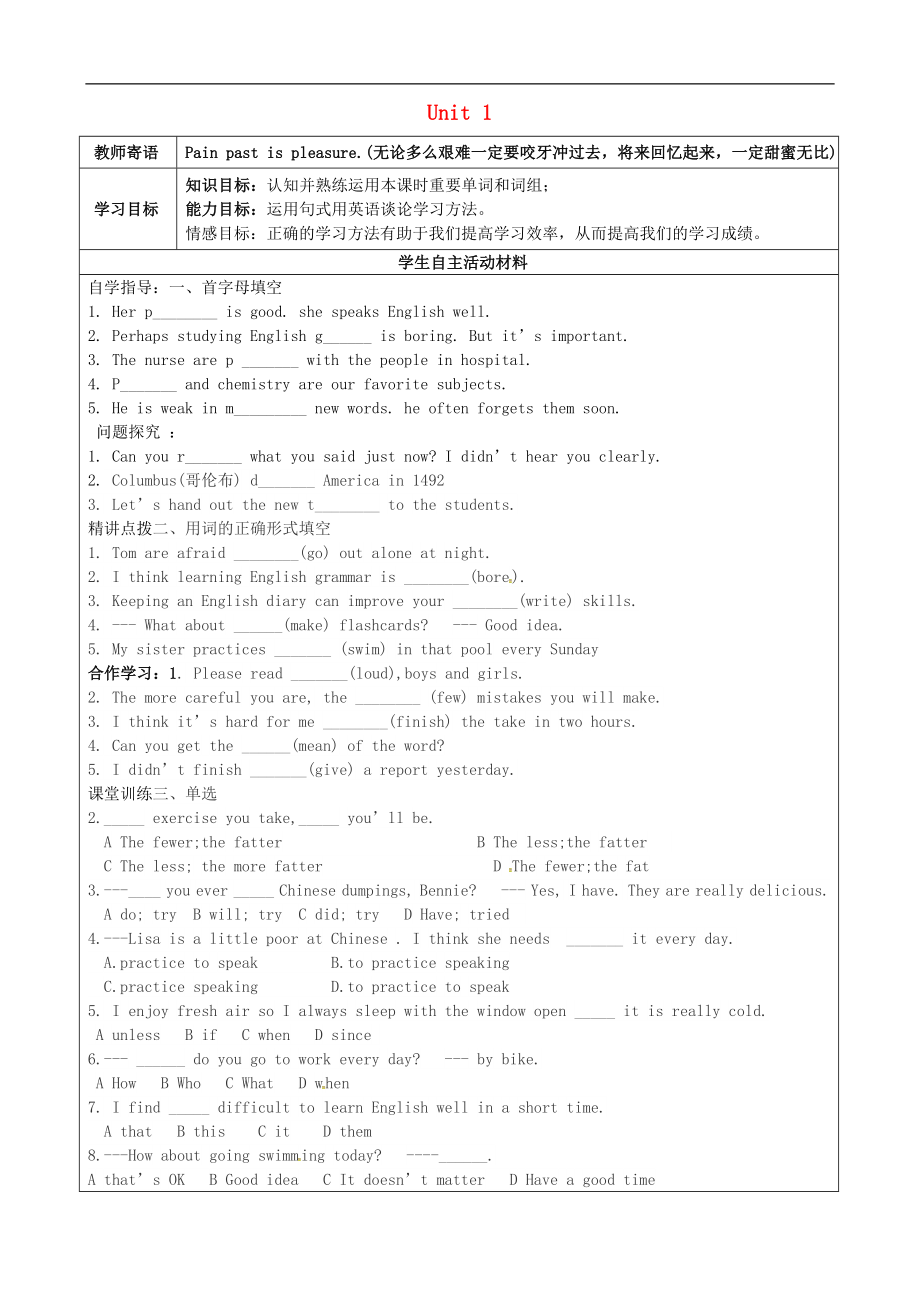《山東省廣饒縣丁莊鎮(zhèn)中心初級(jí)中學(xué)九年級(jí)英語全冊(cè) Unit 1 How can we become good learners Section A(3a-4c)學(xué)案(無答案)(新版)人教新目標(biāo)版》由會(huì)員分享,可在線閱讀�,更多相關(guān)《山東省廣饒縣丁莊鎮(zhèn)中心初級(jí)中學(xué)九年級(jí)英語全冊(cè) Unit 1 How can we become good learners Section A(3a-4c)學(xué)案(無答案)(新版)人教新目標(biāo)版(3頁珍藏版)》請(qǐng)?jiān)谘b配圖網(wǎng)上搜索。
1�、
Unit 1
教師寄語
Pain past is pleasure.(無論多么艱難一定要咬牙沖過去,將來回憶起來��,一定甜蜜無比)
學(xué)習(xí)目標(biāo)
知識(shí)目標(biāo):認(rèn)知并熟練運(yùn)用本課時(shí)重要單詞和詞組;
能力目標(biāo):運(yùn)用句式用英語談?wù)搶W(xué)習(xí)方法�����。
情感目標(biāo):正確的學(xué)習(xí)方法有助于我們提高學(xué)習(xí)效率���,從而提高我們的學(xué)習(xí)成績��。
學(xué)生自主活動(dòng)材料
自學(xué)指導(dǎo):一���、首字母填空
1. Her p________ is good. she speaks English well.
2. Perhaps studying English g______ is boring.
2、But it’s important.
3. The nurse are p _______ with the people in hospital.
4. P_______ and chemistry are our favorite subjects.
5. He is weak in m_________ new words. he often forgets them soon.
問題探究 :
1. Can you r_______ what you said just now? I didn’t hear you clearly.
2. Columbus(哥倫布) d_
3�����、______ America in 1492
3. Let’s hand out the new t________ to the students.
精講點(diǎn)撥二���、用詞的正確形式填空
1. Tom are afraid ________(go) out alone at night.
2. I think learning English grammar is ________(bore).
3. Keeping an English diary can improve your ________(write) skills.
4. --- What about ______(m
4����、ake) flashcards? --- Good idea.
5. My sister practices _______ (swim) in that pool every Sunday
合作學(xué)習(xí):1. Please read _______(loud),boys and girls.
2. The more careful you are, the ________ (few) mistakes you will make.
3. I think it’s hard for me ________(finish) the take in two hours.
4. Can
5�、you get the ______(mean) of the word?
5. I didn’t finish _______(give) a report yesterday.
課堂訓(xùn)練三、單選
2._____ exercise you take,_____ you’ll be.
A The fewer;the fatter B The less;the fatter
C The less; the more fatter D The fewer;the fat
3.---____
6���、you ever _____ Chinese dumpings, Bennie? --- Yes, I have. They are really delicious.
A do; try B will; try C did; try D Have; tried
4.---Lisa is a little poor at Chinese . I think she needs _______ it every day.
A.practice to speak B.to practice speaking
C.practice speaking
7��、 D.to practice to speak
5. I enjoy fresh air so I always sleep with the window open _____ it is really cold.
A unless B if C when D since
6.--- ______ do you go to work every day? --- by bike.
A How B Who C What D when
7. I find _____ difficult to learn English well in a
8���、 short time.
A that B this C it D them
8.---How about going swimming today? ----______.
A that’s OK B Good idea C It doesn’t matter D Have a good time
9. I’m afraid ____ in class ____ my poor pronunciation.
A to speak; because B to say; because C to speak; because of
9�����、 D to speaking; because of
10. I fell in love _____ Guilin _____ when I went there for the first time.
A with; as well as B of ;too C with; either D with; as well
11. There are too many words. So I have to ______ in a dictionary.
A look up them B look them up C look for it D look it
10����、 up
12. I sit in the front of the classroom ______ I can hear everything clearly.
A so that B in order to C because D because of
13.--- Tommy, you can never let others know what I have told you today.
-- don’t worry, I will keep the _____.
A money B secret C address D grade
14.—Wh
11�、at about ____ the teacher ____help ___ first? --- Good idea.
A ask;to;in B asking;for;at C asking;about;in D wait;for;at
15. --- How did you go to Sanya last week? ---____ the train
A In B Took C used D By
16. To get the main idea of a passage, you needn’t read ______.
A word
12、 in word B word by word C words and words D in a word
17. What is the best way ____the question?
A answer b answering C to answer D to answering
18.When we heard the _____ news, we got ______.
A exciting;excited B excited;exciting C excited;excited D exciting;exciting
19 W
13���、e have two rooms ______,but I can’t decide ________.
A to live;to choose which one B lived;choose which one C to live in;which one to choose D live;which one
(Homework)四�、動(dòng)詞填空
Mr Turner used (go) fishing in the countryside every week. It was his favorite sport. He often fished fo
14�、r several hours without (catch) anything at all. But this didn’t worry him. He always went home with an empty bag. “You must give up (fish),” his friends said, “It’s a waste of time!” “But they don’t realize one thing. I only enjoy (sit) in a boat and doing nothing at
15���、 all. Fishing can make me (forget) the noise of the city and live quietly for some time.” He always said to himself.
五����、短文填空:在下面短文的每個(gè)空白處填入適當(dāng)?shù)脑~,每空只填一詞�,首字母已給出。
Students learn their lessons in class. They sit in the classroom and l to the teacher. This is a way of learning. Is this t
16�、he o way for students to learn? Of course not. There is another way to learn. That is students can teach themselves. For e , if you cannot remember something when you are doing your homework, what will you do? You can look at your books to f the answers.
How to teach
17、 yourself? The first thing you must do is reading. Read something you are i in, or you have to read. The second is that you must ask yourself questions. A clever student is usually g at asking questions. The third is to answer the questions yourself by w hard, by reading b
18��、ooks, and sometimes by asking o people. There are the ways of teaching yourself. If you keep doing l these for a long time, You are sure to have great s in your study.
自我評(píng)價(jià)專欄(分優(yōu)良中差四個(gè)等級(jí))
自主學(xué)習(xí): 合作與交流: 書寫: 綜合:
3
 山東省廣饒縣丁莊鎮(zhèn)中心初級(jí)中學(xué)九年級(jí)英語全冊(cè) Unit 1 How can we become good learners Section A(3a-4c)學(xué)案(無答案)(新版)人教新目標(biāo)版
山東省廣饒縣丁莊鎮(zhèn)中心初級(jí)中學(xué)九年級(jí)英語全冊(cè) Unit 1 How can we become good learners Section A(3a-4c)學(xué)案(無答案)(新版)人教新目標(biāo)版

